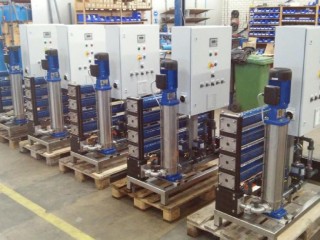Project Results:
The project ‘Water Technology Academy pilot Ghana’ overall attempted to introduce a new dimension to capacity building programs for water operators. It focused on performance support aiming to improve the effectiveness (higher quality more sustainable result) and at the same time improve the efficiency (lower cost) of the capacity building programs from technology providers, water utilities and NGOs. The pilot aimed to support capacity building in the workplace to make sure that people have access to content exactly where and when it is needed. The logic behind setting up e-learning courses was the fact that: 10% of learning takes place in formal settings (classroom), 20% via informal learning (colleagues) and 70% through experiences in the workplace.
Key results
- Development of ‘Basics of Water technology’, a course for non-technical / low-educated people to learn about water purification systems, aimed at an international market in mostly developing countries
- Creation of Operation and Maintenance Manuals in video format of DWP water purification equipment for WHI in Ghana
- Partners in the consortium initiated follow-up projects
Tips for the future
- Continue to monitor the usage of the online environment, to determine whether, next to higher positioned Water Health staff, also operators are using the environment
- Measure if installations where the online environment is used, are working more sustainably than the installations where operators are not using the online water environment.
Project partners
Dutch partner ‘Empower People’ was in the lead and the local partner was ‘Water Health Ghana’. Other partners involved were: Dutch Water Partners, CIV Water, SkillsTown, Waterkennisbank and MOOR Filtertechniek.
Period
September 2016 – December 2017
Location
Accra, GhanaLast project updates
No updates yet
Background
Many developing countries are suffering from problems related to safe and clean water supply of their inhabitants. Smart engineers worldwide are as we speak developing new appropriate technologies and adapt technologies to local markets. This is an expensive process and not often disappointing for both the technology provider and the local communities. The local communities simply lack the right knowledge base to work with these ‘western’ technologies. Education in developing countries is not up to the standards as it is in developed countries. Students from developing countries often do not have access to good education, due to the costs that are connected to it and often relocate for study purposes. Capacity building on a larger scale is almost impossible with current economic situations in developing countries. Furthermore, much of the expertise needed to teach these students is not available in the country, which makes the education of these students in the water sector even harder.
Many NGOs, water companies and technology providers are trying to tackle the water issue by bringing technologies from developed countries into developing countries and making sure that there is clean water supply. These organisations also realise themselves that awareness raising and capacity building of the local community is key to the success of their project. But still they are not able to really solve this issue because it is simply too expensive to fly in international water experts to their projects and continuously be there to answer questions. So getting and retaining knowledge in developing countries is a real issue.
When a water technology project is running on site, the knowledge is transferred on the spot and some handouts and materials are left behind. But unfortunately most of what the organizations have learned the local project teams will already be forgotten by the time the project organization has left the country. And on top of that the teams often encounter situations or issues on a daily basis, that wasn’t covered in the learning cycle. Therefore the local population needs a performance support solution in the workplace to be able to access the relevant content in their moment of need. This is exactly what we will introduce in this pilot project.
Project Plan
Step 1: Assessment specific learning needs
This step asks the one question needed from a content point of view: What does the local team need to learn. For the design of the learning activities, which could be both online learning modules as well as essentials, we first need to do a thorough learning needs assessment. In this assessment we will see the critical tasks that the local teams need to be able to do, what they have learned already during the project and what they need to be able to access when the local teams have left the site. Based on this information we can decide what kind of learning they need and how they need to receive this knowledge. So what knowledge needs to be put in video, what needs to be put in a module and what needs to be put in essentials.
Step 2: Design first learning programs and activities + video recording
In this step we will be doing video recording both in the Netherlands and on site, to make sure we capture exactly what knowledge needs to be transferred and put into the learning activities. This video recording will be done by a team of students to keep costs as low as possible. Besides the recording of videos this step will also entail building the modules and essentials in the online system. The first ones will be created and designed by Empower People, CIV Water and SkillsTown, together with the team of students.
Step 3: Technology training local teams
The local teams need to be able to work with the learning system as well as be able to create their own essentials. Therefore Empower People will train the local teams on being able to work with the learning technology. This is very easily taught and the essentials are easily created, but still preliminary training is needed of course.
Step 4: Monitoring
After the first modules have been created and the local teams know how to create their own content essentials and use the system, we will also start monitoring the process. The aim of the project is to improve the effectiveness (higher quality, more sustainable result) and at the same time improve the efficiency (lower cost) of the capacity building program. Therefore we will set-up a complete monitoring and evaluation program. Added value of this demonstration is that projects will be realized in several communities. Therefore it is relatively easy to set-up a monitoring plan and compare the situation with and without the Water Technology Academy.
Step 5: Evaluation and completion pilot
After enough results and lessons learned have been gathered the project partners will initiate and evaluate the project. This will not only focus on what we can learn from this demonstration but also on building a marketing and PR case for a broader launch of the water technology academy.
Target group
The target group for the Water Technology Academy are the local operators of the drinking water facility and the local technicians around the facility.
Sustainability
When the project is a success the academy will be rolled out broadly via Dutch and local partners. There is already wide interest from organizations like VitensEvides International, Plan International, Nuffic, etc.
Overview of Goals
With the Water Technology Academy we are introducing a new dimension to the capacity building programs. We will focus on Performance Support aiming to improve the effectiveness (higher quality more sustainable result) and at the same time improve the efficiency (lower cost) of the capacity building programs from technology providers, water utilities and NGO’s.
Results and indicators
- Recognizion of learning needs
- Matrix of learning needs
- Basic course and essentials
- Technicians and operators are ready to use the system
- DWP-essentials online
- Usage of basic course and essentials
- Trained technicians and operators
- Online platform in use by technicians and operators
- Higher quality of the capacity building program
- Business plan for the role out of the WTA
- Insight in efficiency and effectiveness of the WTA
- Broad introduction of the WTA
- Professional operation of DWP-plant
- Sustainable capacity building and drinking water production


